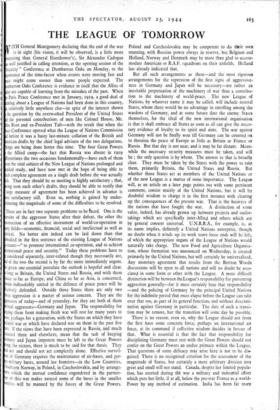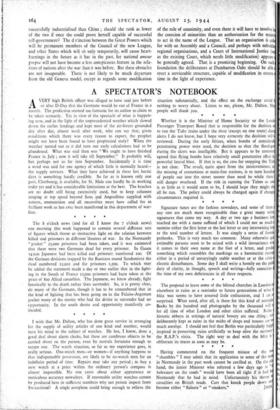THE LEAGUE OF TOMORROW
rni General Montgomery declaring that the end of the war is in sight (his vision, it will be observed, is a little more tracing than General Eisenhower's), Sir Alexander Cadogan well justified in calling attention, at the opening session of the Security" Conference at Dumbarton Oaks on Monday, to the portance of the time-factor when events were moving fast and e might come sooner than some people expected. The mbarton Oaks Conference is evidence in itself that the Allies of ay are capable of learning from the mistakes of the past. When Paris Peace Conference met in January, 1919, a good deal of g about a League of Nations had been done in this country, t relatively little anywhere else—in spite of the interest shown the question by the overworked President of the United States the personal contributions of men like Colonel House, Mr.
u Root and ex-President Taft—with the result that when the ce Conference opened what the League of Nations Commission d before it was a hasty last-minute collation of the British and erican drafts by the chief legal advisers of the two delegations. ngs are being done better this time. The four Great Powers the Allied camp—the fact that Russia was absent in 1919 erentiates the two occasions fundamentally—have each of them en the vital subject of the New League of Nations prolonged and railed study, and have now met in the hope of being able to ch complete agreement on a Single draft before the war actually Is. That they should be so meeting is highly satisfactory ; that, ring seen each other's drafts, they should be able to testify that large measure of agreement has been achieved in advance is e satisfactory still. Even so, nothing is gained by under- mating the magnitude of some of the difficulties to be resolved.
There are in fact two separate problems to be faced. One is the raint of the aggressor States after their defeat, the other the nstruction of an effective instrument of world-co-operation in y fields—economic, financial, social and intellectual as well as ideal. No better aim indeed can be laid down than that bodied in the first sentence of the existing League .of Nations venant—" to promote international co-operation, and to achieve emational peace and security." Today these problems have to considered separately, inter-related though they necessarily are, of the two the second is by far the more immediately urgent. given one essential postulate the outlook is hopeful and clear. long as Britain, the United States and Russia, and with them ce so far as Europe, and China so far as Asia, is concerned, am n indissolubly united in the defence of peace peace will be ectively defended. Outside those States there are only two ose aggression is a matter of serious concern. They are the lessors of today—and of yesterday, for they are both of them tual aggressors—Germany and Japan. The responsibility for Ping them from making fresh war will rest for many years to me, perhaps for a generation, with the States on which they have lared war or which have declared war on them in the past five rs. If the views that have been expressed in Russia, and much ussed there and elsewhere, mean that the task of keeping mlany and Japan impotent must be left to the Great Powers tug the victors, there is much to be said for that thesis. They not and should not act completely alone. Effective surveil- of Germany requires the maintenance of air-bases, and per- Ps military bases, around her frontiers—in the Low Countries, Southern Norway, in Poland, in Czechoslovakia, and by arrange- s which the mutual confidence engendered in the partner- Ps of this war makes natural some of the bases in the smaller tries will be manned by the forces of the Great Powers. Poland and Czechoslovakia may be competent to do tlxir own manning, with Russian power always in reserve, but Belgium and Holland, Norway and Denmark may be more than glad to accom- modate American or R.A.F. Equadrons on their airfields. Holland has already indicated that.
But all such arrangements as these—and the most rigorous arrangements for the repression of the first signs of aggressive- ness in Germany and Japan will be necessary—are rather an inevitable perpetuation of the machinery of war than a contribu- tion to the machinery of world-peace. The new League of Nations, by whatever name it may be called, will include neutral States, whom there would be no advantage in enrolling among the wardens of Germany, and at some future date the enemy States themselves, for the ideal of the new international organisation is that it shall embrace all States as soon as all can give the neces- sary evidence of loyalty to its spirit and aims. The war against Germany will not be finally won till Germany can be counted oá to threaten the peace of Europe as little as Britain or France or Russia. But that day is not near, and it may be far distant. Mean- while the necessary security measures must be taken, and will be ; the only question is by whom. The answer to that is broadly clear. They must be taken by the States with the power to take them, primarily Britain, the United States and Russia. But whether those States act as members of the United Nations or of the new League is a matter of some importance. The League will, as an article on a later page points out with some pertinent comment, consist mainly of the United Nations, but it will be doubtful wisdom to charge it in the first instance with clearing up the consequences of the present war. That is the business of the nations that have fought the war. A distinction of some value, indeed, has already grown up between projects and under- takings which are specifically inter-Allied and others which are by general consent universal. U.N.R.R.A., for example, is, as its name implies, definitely a United Nations enterprise, though no doubt when it winds up its work some loose ends will be left, of which the appropriate organs Of the League of Nations would naturally take charge. The new Food and Agriculture Organisa- tion, whose formation was announced on Wednesday, is created primarily by the United Nations, but will certainly be universalised. Any monetary agreement that results from the Bretton Woods discussions will be open to all nations and will no doubt be asso- ciated in some form or other with the League. A more difficult distinction will be between the League's responsibility for preventing aggression generally—for it must certainly bear that responsibility —and the policing of Germany by the principal United Nations for the indefinite period that must elapse before the League can take over that too, as part of its general functions and without discrimi- nation against Germany in particular. The date of such a transi- tion may be remote, but the transition will some day be possible.
There is no reason, even so, why the League should not front the first have some concrete force, perhaps an international air force, at its command if collective wisdom decides in favour of that. What is essential is that the fact that responsibility for disciplining Germany must rest with the Great Powers should not confer on the Great Powers an undue primacy within the League. That questions of some delicacy may arise here is not to be dis- guised. There is no recognised criterion for the assessment of the magnitude of States, but certainly a mere arbitrary division into great and small will not stand. Canada, despite her limited popula- tion, has exerted during thb war a military and industrial effort which puts her little, if at all, below the pre-war France as a world- Power by any method of• estimation. India has been fir more successfully industrialised than china; should she rank as lower of the two if once she could prove herself capable of successful self-government? The d:stinction between the Great Powers which will be permanent members of the Council of the new League, and other States which will sit only temporarily, will cause heart- hurnings in the future as it has in the past, for national amour propre will not have become a less conspicuous feature in the rela- tions of nations after the war than it was before. But these obstacles are not insuperable. There is not likely to be much departure from the old Geneva model, except as regards some modification of the rule of unanimity, and even there it will have to involve the coercion of minorities than an authorisation for the majo to act in the name of the League. That an organisation is Ca for with an Assembly and a Council, and perhaps with subsid regional organisations, and a Court of International Justice (su as the existing Court, which needs little modification) appears be generally agreed. That is a promising beginning. On such foundation the deliberators at Dumbarton Oaks should be able erect a serviceable structure, capable of modification in course time in the light of experience.



























 Previous page
Previous page